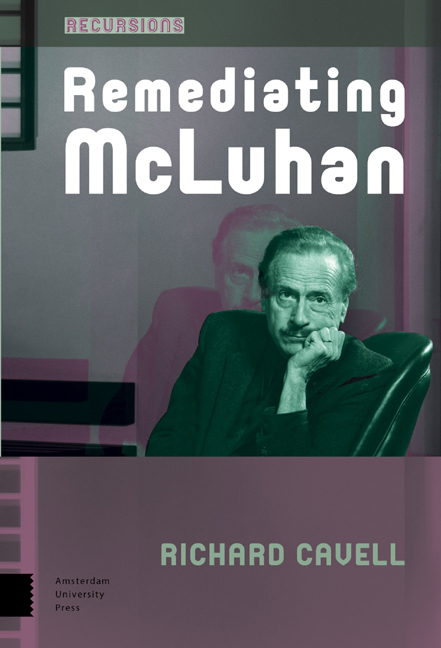Book contents
- Frontmatter
- Dedication
- Contents
- Introduction
- List of sigla
- I
- Re: Mediation
- 1 Beyond McLuhanism
- 2 McLuhan and the Question of the Book
- Embodiment as Incorporation
- 3 McLuhan and the Body as Medium
- 4 McLuhan, Tactility, and the Digital
- 5 Mechanical Brides and Vampire Squids
- Empathic Media
- 6 McLuhan: Motion: e-Motion: Towards a Soft Ontology of Media
- 7 Re-Mediating the Medium
- Determining Technology
- 8 McLuhan, Turing, and the Question of Determinism
- 9 Angels and Robots
- Being Mediated
- 10 Marshall McLuhan’s Echo-Criticism
- 11 McLuhan and the Technology of Being
- II
- 12 The Tragedy of Media: Nietzsche, McLuhan, Kittler
- Coda: On the 50th Anniversary of Understanding Media
- Notes
- Works Cited
- Index
4 - McLuhan, Tactility, and the Digital
Published online by Cambridge University Press: 12 December 2020
- Frontmatter
- Dedication
- Contents
- Introduction
- List of sigla
- I
- Re: Mediation
- 1 Beyond McLuhanism
- 2 McLuhan and the Question of the Book
- Embodiment as Incorporation
- 3 McLuhan and the Body as Medium
- 4 McLuhan, Tactility, and the Digital
- 5 Mechanical Brides and Vampire Squids
- Empathic Media
- 6 McLuhan: Motion: e-Motion: Towards a Soft Ontology of Media
- 7 Re-Mediating the Medium
- Determining Technology
- 8 McLuhan, Turing, and the Question of Determinism
- 9 Angels and Robots
- Being Mediated
- 10 Marshall McLuhan’s Echo-Criticism
- 11 McLuhan and the Technology of Being
- II
- 12 The Tragedy of Media: Nietzsche, McLuhan, Kittler
- Coda: On the 50th Anniversary of Understanding Media
- Notes
- Works Cited
- Index
Summary
Tactility is the world of the interval, not of the connection.
McLuhan and Parker, Through the Vanishing Point (1968)To the sense of touch, all things are sudden, counter, original, spare, strange.
McLuhan, Understanding Media (1964)In 1967, Marshall McLuhan published one of the defining books of his career: The Medium is the Massage. A classic example of remediation, this book not only played on one of McLuhan's most famous utterances, ‘the medium is the message’, but also inverted the linear, sequential ‘rationality’ and causal determinism deriving from the book as medium. In The Medium is the Massage there are more illustrations than there is print, the book can be read in any order, and McLuhan de-authorises his own relationship to this book by producing it collaboratively. As a result, it can be argued that the book cannot be read at all; it can only be experienced. However, to speak of The Medium is the Massage as one book is itself misleading, since McLuhan published this work simultaneously in two radically different formats: a standard 4 inch by 6 inch paperback, and a large 6 inch by 11 inch hardback edition. In doing so, he forced his readers to confront not only the paradox of remediation—that each medium contains its mediatic other—but also the paradox of the visual: that it embodies the vestigial traces of the senses that visual culture has repressed, and in particular tactility, the term McLuhan deployed to refer to the senses in touch with each other. Thus, McLuhan emphasises the role that touch plays in reading: it has the same relationship to vision as the white background has to black typography. Touch, in other words, provides the ground that allows the figure of abstract visualisation to signify.
The effect of electronic mediation, McLuhan suggested, would be a re-integration of the perceptual field of all the senses, not just the visual; electronic media thus proposed a return to sensual, affective, involving communication. In eliminating the fixed perspective imposed by literacy, electronic media had the effect of involving the viewer as (co)producer of the work's meaning. This element of involvement was part of a much larger sensory revolution that had an apotheosis of sorts in the 1960s.
- Type
- Chapter
- Information
- Remediating McLuhan , pp. 49 - 56Publisher: Amsterdam University PressPrint publication year: 2016



